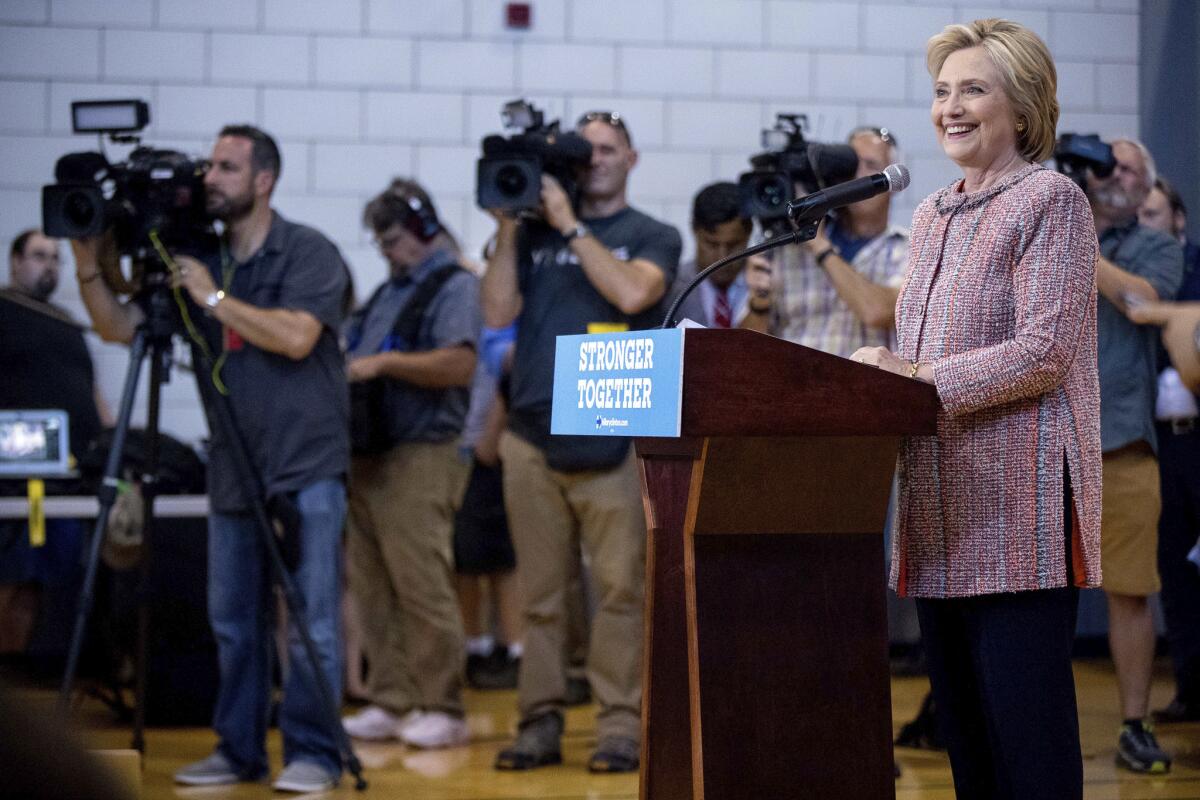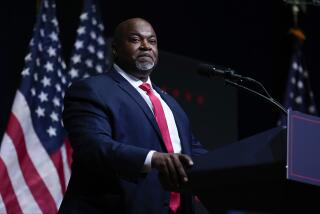Op-Ed: If Clinton loses, blame the email controversy and the media

If Hillary Clinton loses the presidential election in November, we will know the reason. The email controversy did her candidacy in. But it needed a helping hand — and the news media readily supplied that.
My analysis of media coverage in the four weeks surrounding both parties’ national conventions found that her use of a private email server while secretary of State and other alleged scandal references accounted for 11% of Clinton’s news coverage in the top five television networks and six major newspapers, including the Los Angeles Times. Excluding neutral reports, 91% of the email-related news reports were negative in tone. Then, there were the references to her character and personal life, which accounted for 4% of the coverage; that was 92% negative.
Campaign 2016 updates: Clinton finishes August with millions more in cash on hand than Trump »
While Trump declared open warfare on the mainstream media — and of late they have cautiously responded in kind — it has been Clinton who has suffered substantially more negative news coverage throughout nearly the whole campaign.
Few presidential candidates have been more fully prepared to assume the duties of the presidency than is Clinton. Yet, her many accomplishments as first lady, U.S. senator, and secretary of State barely surfaced in the news coverage of her candidacy at any point in the campaign. She may as well as have spent those years baking cookies.
How about her foreign, defense, social or economic policies? Don’t bother looking. Not a single one of Clinton’s policy proposals accounted for even 1% of her convention-period coverage; collectively, her policy stands accounted for a mere 4% of it. But she might be thankful for that: News reports about her stances were 71% negative to 29% positive in tone. Trump was quoted more often about her policies than she was. Trump’s claim that Clinton “created ISIS,” for example, got more news attention than her announcement of how she would handle Islamic State.
Trump was quoted more often about [Hillary Clinton’s] policies than she was.
I also looked at the year before the 2016 primaries began, and even then Clinton had a 2-to-1 ratio of bad press to good press. There was only one month in the whole of 2015 where the tone of her coverage on balance was not in the red — and even then it barely touched positive territory.
During the primaries, her coverage was again in negative territory and again less positive than Trump’s. After the conventions got underway and Trump got embroiled in a testy exchange with the parents of a slain Muslim U.S. soldier, the tone of his coverage nosedived and her coverage looked rosy by comparison. But even then it was not glowing. Her convention-period news coverage was 56% negative to 44% positive.
Clinton’s emails and the accompanying narrative — “she can’t be trusted” — have been a defining feature of coverage from the campaign’s start. Only occasionally have reporters taken the narrative a step further. How important, exactly, are her emails in the larger context of presidential fitness? And just how large a transgression are they?

Despite finding 110 instances of emails sent or received on Clinton’s server containing classified information, the FBI does not recommend prosecution saying that “no prosecutor would bring such a case.”
Judging from their stories, journalists rate the emails as being a highly important and very serious issue. They cover it heavily and with damning tone. When 90% or more of the coverage of a subject is negative, the verdict is in. Even good news gets turned to her disadvantage. For example, when the FBI announced that her emails did not violate the law, the Los Angeles Times ran a story focused on Trump’s response, quoting him as saying, “This is one of the most crooked politicians in history…. We have a rigged system, folks.”
In today’s hypercompetitive media environment, journalists find it difficult to resist controversies. Political scientist W. Lance Bennett explored this phenomenon around Trump’s 2011 allegation that President Obama was not a native-born American. Trump’s “birther” statements were seized upon by cable outlets and stayed in the headlines and on newscasts for days. Veteran CNN correspondent Candy Crowley even interviewed Trump, who was then not a political figure at all. She justified it by saying on air: “There comes a point where you can’t ignore something, not because it’s entertaining .... The question was, ‘Is he driving the conversation?’ And he was.” In truth, the news media were driving the conversation, as they have with Clinton’s emails.
Decades ago, the Hutchins Commission on Freedom of the Press concluded that reporters routinely fail to provide a “comprehensive and intelligent account of the day’s events in the context that gives them some meaning.” Whatever else might be concluded about the coverage of Clinton’s emails, context has been largely missing. Some stories spelled out how the merging of private and official emails by government officials was common practice. There were also some, though fewer, that tried to assess the harm, if any, that resulted from her use of a private server. As for Clinton’s policy proposals and presidential qualifications, they’ve been completely lost in the glare of damaging headlines and sound bites.
Thomas E. Patterson is a professor at Harvard and the author of “Informing the News.”
Follow the Opinion section on Twitter @latimesopinion and Facebook
MORE FROM OPINION
What your kids need to know about marijuana, legalized or not
A new low? Candidates accuse each other of helping terrorists
Donald Trump is what happens when the media choose ideology over facts
More to Read
A cure for the common opinion
Get thought-provoking perspectives with our weekly newsletter.
You may occasionally receive promotional content from the Los Angeles Times.










